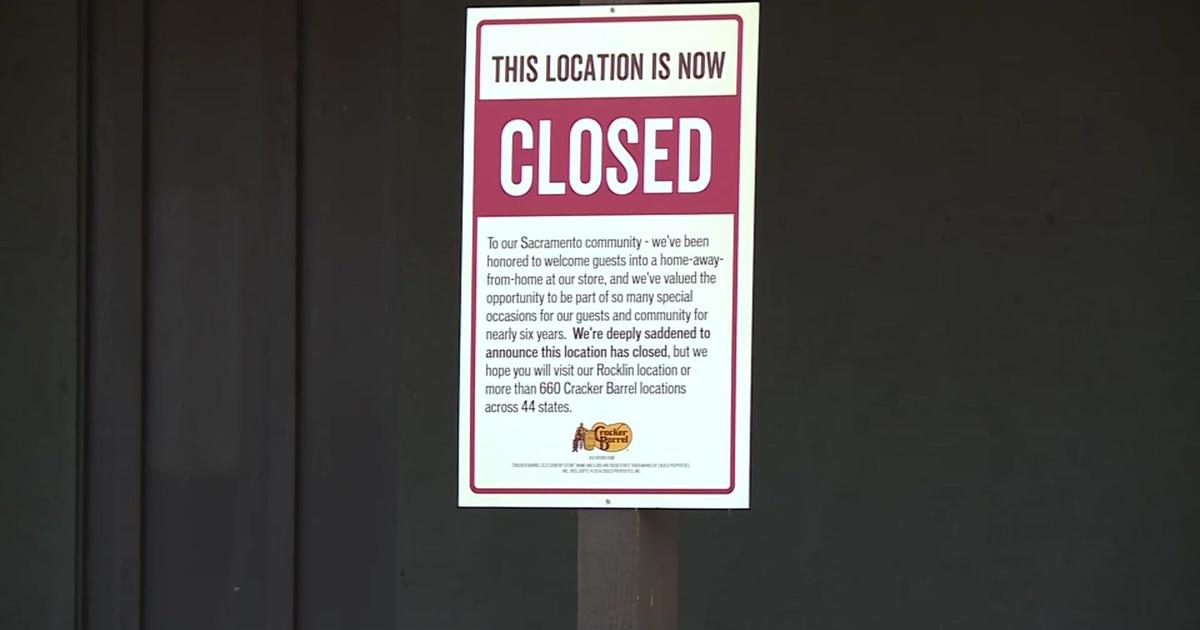Animal Research Facilities' Responses To Our Questions About Dog Research
SACRAMENTO (CBS13) — Lab research on dogs is legal, but heavily regulated. Federal records show 37 facilities in California perform some sort of research on dogs.
The California Biomedical Research Association says dog research has led to medical breakthroughs with pacemakers, insulin pumps, and treatments for things like bleeding disorders and respiratory distress in premature babies.
RELATED STORIES
- Call Kurtis: Is Your Rescue Dog A Research Animal?
- How To Tell If Your Pet Was A Research Subject
- Which Animal Shelters Take In Research Animals?
There are six facilities in the area whose research involved nearly 2,000 dogs in 2015 alone, including UC Davis and Cosumnes River College.
Here are their responses.
UC Davis
How many dogs have been euthanized under your program, and for what reason?
In the past three years 37 dogs have been adopted through our adoption program after participating in studies at UC Davis. Over the same time, four dogs in biomedical research studies were euthanized, either for medical reasons or because it was a necessary part of the study.
As stated in our previous response, we do not source animals for medical research from shelters.
More information about animals in research and teaching at UC Davis can be found here: https://www.ucdavis.edu/news/animals-research-and-teaching-uc-davis
Here is some information along with answers to the questions that you provided. Let me know if you have additional questions. I have not been able to accommodate your request for filming at this time, but will continue trying.About Animal Care at UC Davis
The use of animal models in biomedical research benefits human health and is strictly regulated. Breakthroughs in treatments for illnesses such as Alzheimer's, heart disease, cancer, and HIV/AIDS would not have been possible without studies using animal models of disease.Good scientific research requires strict adherence to the ethical and humane treatment of research animals. At UC Davis we both endorse and enforce the "3Rs principles" in which biomedical researchers search for ways to Replace animals in research when feasible, Reduce the numbers of animals used, and Refine methods to improve animal welfare.
In March 2017, UC Davis was notified that AAALAC International had re-accredited the campus animal care program. AAALAC International is a private, non-profit organization that promotes the humane treatment of animals in science through accreditation and assessment programs. More than 980 universities, companies and other research institutions in 44 countries have volunteered to be inspected and assessed by AAALAC, in addition to complying with federal, state and local laws and regulations.
Researchers at UC Davis study a vast array of diseases and conditions in humans and animals in order to develop cures and preventative measures. The path from fundamental discovery to clinical applications requires multiple steps, and in some cases requires the use of animal models. The most commonly used animals at UC Davis are fish, mice and rats.
The Use of Dogs in Research
Some studies, mostly those focused on investigating a disease, condition or mechanism specific to dogs, may require the use of dogs as research subjects. This may be in the form of biomedical research or clinical trials. Biomedical studies are generally designed to address canine specific needs, such as optimizing drug dose and frequency prior to moving forward with clinical trials. The majority of research using dogs at UC Davis is in the form of clinical trials, where pet owners can elect to have their dog participate based on their individual needs. Both types of studies require review and approval by designated committees to ensure responsible animal care and use.Client-owned dogs used in clinical trials at the veterinary hospital have naturally occurring diseases, and are never inflicted with a disease in order to study it. Many times, clinical trials are used in an effort to save a dog's life when all accepted protocols of care have failed to reverse the dog's illness. No aspect of participation in a clinical trial is done without the owner's consent. Veterinary clinical trials at UC Davis have led to ground-breaking discoveries that are advancing the health of animals.
The following responses are specific to biomedical research. For more information on the use of dogs in clinical studies, please visit this site.
PLEASE LIST THE SHELTERS WHERE YOU GET THESE ANIMALS FROM?
California Civil Code prohibits research facilities from obtaining live animals from shelters for biomedical research purposes.
All dogs assigned to research projects are purchased from an approved research supplier. These animals are bred and raised specifically for research purposes. The suppliers are regulated by the USDA (requiring Class A license) and follow the Animal Welfare Act (AWA), ensuring the highest standards for quality and well-being are met.
UC Davis also operates a program with local shelters where supervised veterinary students spay or neuter animals, which can then be adopted. UC Davis veterinarians also conduct clinical research with shelters to improve the health and well-being of shelter animals
WHAT KNOWLEDGE DOES THE SHELTER HAVE IF ANY ABOUT YOUR PLANS FOR THE DOGS YOU CHOOSE?
Dogs are not adopted from shelters for research projects. See above
WHAT ARE YOU LOOKING FOR, WHEN YOU CHOOSE A DOG?
Selection of the breed is based on the specific research need. Behavioral traits are also considered, since they impact how easy the dogs are to work with and their likelihood of being adopted.
WHAT TYPES OF BREEDS?
Beagles are the most common breed of dog used in research studies at UC Davis.
HOW ARE THESE ANIMALS MARKED? (MICROCHIP/TATTOO, ETC)
Research dogs come to us from the vendors with individual tattoos. Once they arrive, they are also micro-chipped for additional identification.
HOW DOES YOUR ADOPTION PROGRAM WORK, AFTER YOU'RE DONE WITH THEM?
Once the study is complete, the dogs are retired and placed up for adoption according to the Institutional Animal Care and Use Committee adoption policy. Most often, dogs are adopted by the researchers or staff that have worked closely with them during the study.
HOW MANY PETS HAVE BEEN EUTHANIZED UNDER YOUR PROGRAM, AND FOR WHAT REASON?
No pets have been euthanized since they are not used in our biomedical research programs.
Helpful Resources:
Animal Care and Research at UC Davis
https://www.ucdavis.edu/news/animals-research-and-teaching-uc-davisCompleted Clinical Studies with Dogs
http://www.vetmed.ucdavis.edu/clinicaltrials/completed_trials/dogs.cfm
About Animal Clinical Trials
http://www.vetmed.ucdavis.edu/clinicaltrials/owners_ref_vets/faqs.cfm
Specific Examples of Impact
Genetics Unravel Clues to Gliomas (CCAH Update, Spring 2017)
UC Davis Osteosarcoma Clinical Trial Showing Success (November 1, 2016)
Veterinary Ophthalmologist Has Success Treating Cornea Disease, Hopes to Discover Gene Causing Disease
2. Animal Blood Resource Inc., Dixon, CA
We provide transfusion products to veterinarians to save pets lives.
Again, we do not do research nor do we sell animals. We hold a USDA license, but no research is conducted.
3. Carrington College Home Office
Carrington College does not perform research on animals. We are a teaching facility that helps train our students by providing preventative care services on animals owned by our students and faculty, including dental cleanings, radiographs (x-rays) and vaccinations. The animals that visit our clinic are seen under the supervision of California licensed registered veterinary technicians and veterinarians. Carrington College complies with all state and federal regulations.
4. Cosumnes River College
Our adoption program is for dogs and cats. In April of every year we adopt our animals out to the general public. Families are the primary adopters of animals and we receive quite a lot of positive feedback on how well our animals have become beloved family members. Many times, our students and employees will form a particular bond with an animal and wind up adopting one. We generally obtain animals from area shelters such as Sacramento county. We bring in many different breeds of dogs to provide a variety of experiences with different breeds for the students so we do not look for one specific breed, choosing a diverse population instead.
----
Just to reiterate, Cosumnes does not do research on animals. We adopt about a dozen dogs and cats from local shelters and house them in kennels on campus (the cats are kept inside, while the dogs have inside/outside kennels). Our Vet Tech students take care of these animals throughout the year. They are vaccinated and spayed or neutered. They go through training and socialization to prepare them for adoption at the end of the spring semester.
The Animal Welfare Act, USDA/APHIS regulations governs licensing and classification. Class R is a research facility institution, these are ALL public and private institutions that utilize animals in research, etc. We come under that classification, most likely because there is no other way to classify us, but we DO NOT conduct animal research in any way. Also, our program is accredited by the AVMA.
5. Young Veterinary Research Services
The studies conducted at YVRS focus primarily on veterinary care (i.e. dietary/health and nutritional issues, flea and tick prevention, and other veterinary animal care).
----
Due to the nature of the studies YVRS conduct, they do not routinely euthanize animals upon the conclusion of a project. The animals are returned to the colony until they are suitable for a specific study again. This greatly reduces the number of animals used in YVRS research. In addition, YVRS currently has an in-house adoption policy and employees may adopt any animal at anytime. YVRS does not adopt to outside parties due to the inability to adequately screen potential homes for suitability, particularly in the light of organizations such as (Organization Purposefully Redacted by CBS Corporate Attorney & KOVR) that take animals and promptly euthanize them.
In addition, in case your viewers are wondering, YVRS has NEVER and will NEVER accept animals from area shelters. The animals in the YVRS colonies are specifically bred for research by USDA-licensed CLASS A dealers and have never previously been pets.
----
Zachary Young forwarded your email below to me and has asked me to respond on their behalf as Young Veterinary Research Services (YVRS) is a member of the California Biomedical Research Association (CBRA). CBRA is a consortium of academic institutions, voluntary health agencies, hospitals, professional societies, not-for-profit medical research institutes, and the major medical products and pharmaceutical companies with facilities in California, Nevada and the greater western region. In addition, CBRA serves as the primary voice for the biomedical research community within the region.
I understand you have been contacted by a viewer with some questions regarding the work of Young Veterinary Research Services as well as some additional questions regarding the animals YVRS works with… In hopes of answering some of your questions, I am attaching a few documents that I hope will help to address some of the below questions. In addition, I have also attached YVRS's official research policy.
If you have additional questions or would like additional information, the CBRA website http://www.ca-biomed.org/news-and-programs/reporters.aspx is a great resource.
6. BioAssist Inc.
Called BioAssist to follow up on the email sent to them, Spoke to Dr. Jon G. Whitehairat BioAssist Inc, Vacaville.
He told us, that he's aware of the story we're working on and that he saw our email. Then Dr. Jon G. Whitehairat said, "Can't talk about the story, due to confidentiality."
Then he abruptly got off the phone.
Email sent to BioAssist:
A viewer wrote to us with a couple of questions after learning dogs are used for research in our area. Therefore, we're reaching out to all the schools and research facilities in our area. Our viewer is concerned about what happens to these dogs afterward. We were curious about the benefits of your research and what happens to these animals after the research.
NEVER RECEIVED AN EMAIL RESPONSE FROM BIOASSIST.



